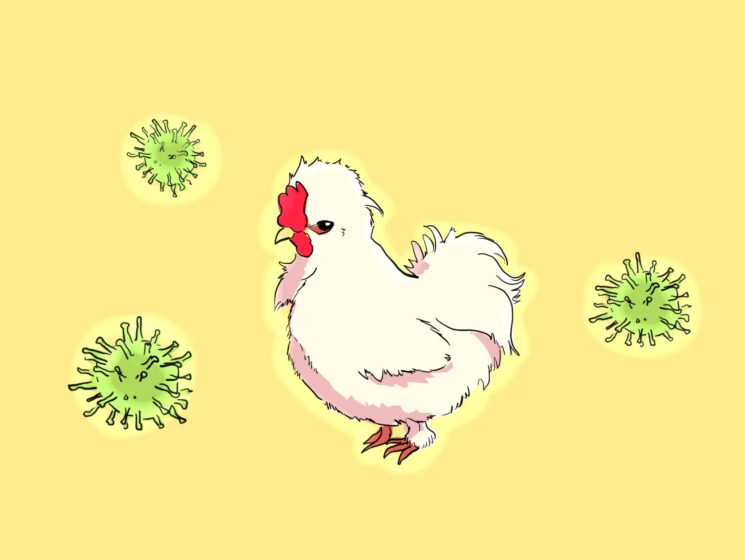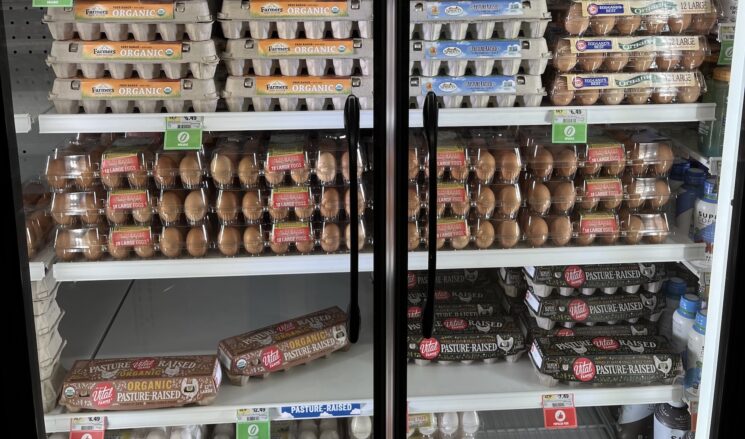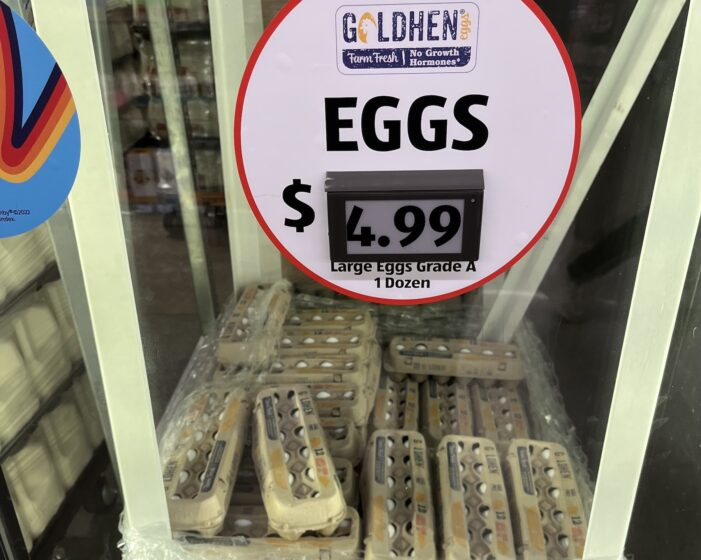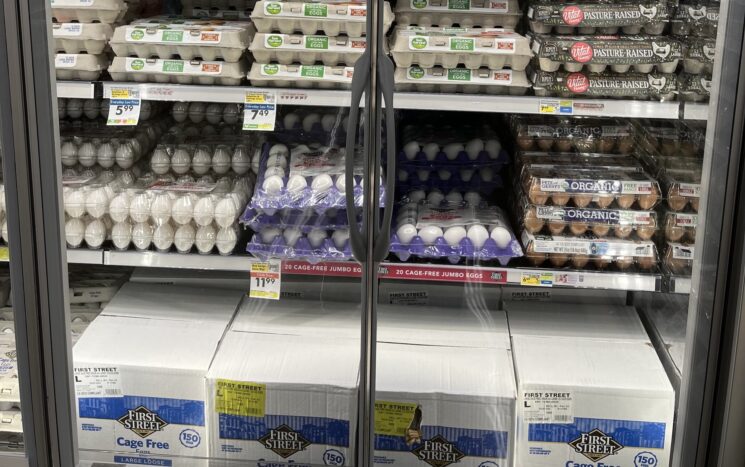By Hannah Park

Egg prices soar as highly pathogenic avian influenza (HPAI) devastates chickens across the United States. The virus, spread by asymptomatic wild birds along their migratory routes, has led to the deaths of 52.7 million birds.
However, chicken farmers, not the virus, are responsible for the majority of deaths. Since the HPAI virus has a staggering 90-100% mortality rate in chickens, hitting the major organs within 48 hours, farmers have “depopulated” their flocks to limit the virus’s spread.
NPR writer Bill Chappell calls the current epidemic “the deadliest U.S. bird flu outbreak in history.”
Since commercial flocks can number hundreds of thousands of birds each, killing just one flock can have an impact on egg production. And now, with the virus affecting 46 states, consumers nationwide are seeing higher egg prices in grocery stores. Average egg prices have soared 325% since last year ($1.33 to $4.33).
California
Californians are especially affected by the egg shortage. The implementation of Proposition 12 on Jan. 1, 2022 mandated that all eggs produced in California be from cage-free chickens.
While the animal welfare act was a major step in securing better living conditions for poultry and other livestock, it also meant that chickens could come into contact with disease-carrying wild birds. And, as California is home to almost 14 million egg-laying chickens (it ranks 10th among the U.S. states), it was hard-hit by the HPAI epidemic.
Take a look at how the egg shortage affects some local Fountain Valley grocery stores.
Note: All photos were taken on Sunday, Feb. 5, 2023, in order to maintain consistency in supply and price reporting.
Sprouts

The average price of the eggs at Sprouts was 56 cents per egg or $6.74 per dozen. However, except for the Organic Pasture-Raised eggs from Vital Farms, most egg brands are far from selling out.
Other pasture-raised eggs, such as the Sprouts’ brand eggs, are in good supply, suggesting no connection between pasture-raised eggs and scarcity.
Aldi

Data was scarce at Aldi’s grocery store since Aldi has a partnership with only one nonorganic egg supplier: Goldhen. The price of one dozen Goldhen eggs, as shown above, is $4.99.
Smart & Final

The average price of eggs in this grocery store was around 51 cents per egg or $6.20 per dozen. Whether cage-free or organic, eggs remain plentiful.
All data collected from personal observation is prone to error, especially in terms of scarcity. Depending on when stores restock their eggs, one can see both many and few eggs available for purchase throughout the week.
Additional Concerns
Are fewer people buying eggs because of the price hike?
According to IRi, a research firm, sales have only dropped around 2% since Dec. 4. Since most people are willing to pay extra in order to buy this breakfast staple, demand for eggs remains high.
What are the symptoms of HPAI in chickens?
According to the National Chicken Council, “birds with HPAI exhibit…severe symptoms such as lack of energy or appetite, lack of coordination, coughing, sneezing or nasal secretions.”
Is chicken meat also affected by the HPAI epidemic?
Chickens raised for meat, dubbed “broilers,” are a different breed from egg-laying chickens, called “layers.” Although the reason has not been determined yet, broilers are less affected by the avian flu. Surprisingly, the broiler population has actually increased, with production projected to increase by 2% in 2023. Therefore, meat prices are not as affected.
One hypothesis is that broiler chickens have a much shorter lifespan (from 5.5 weeks to nine weeks) compared to laying chickens (around 100 weeks). Since laying chickens live for much longer, they are more susceptible to developing illnesses.
And, as for the consumption of chicken meat, HPAI is not a foodborne illness and has difficulty spreading from birds to humans. As long as humans do not come into contact with infected birds’ blood or droppings, there is little risk of contracting HPAI.
As a matter of fact, the Animal and Plant Health Inspection Service (APHIS) is working with health officials in order to quarantine and depopulate affected flocks. Birds from these flocks will not be consumed as food.
Conclusion
In essence, Fountain Valley is feeling the effects of the national egg shortage. Although the availability of eggs remains high, prices have sharply increased from previous months.
Like any mass outbreak, the HPAI epidemic can sound frightening. But with flocks of millions of birds, viruses and other pathogens can naturally spread from animal to animal. According to the CDC, similar outbreaks (although on a smaller scale) occurred in 2014-2015, 2016, and 2017.
For now, the USDA, farmers and poultry industries are working to contain the situation through various biosecurity measures. With increased training on disease prevention, wildlife management and limiting farm visitors, they hope to improve the health of flocks and return prices back to normal. You can find regular updates on the spread of HPAI here.





